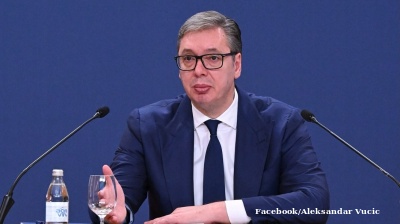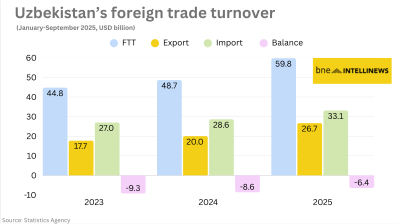The Uzbek government has been proactive in avoiding having any Covid-19 cases in the country thus far and the silver lining to its early stage financial development has made its equity market a golden hedge.
While in late January the government was already conducting temperature checks at international borders and airports, in February Uzbekistan Airways cancelled direct air travel between Uzbekistan and China and Uzbekistan and South Korea. Then the country banned the export of face masks to ensure ample domestic supply, while sending emergency medical supplies to China.
In late February Covid-19 cases were reported throughout the Middle East, namely in Iran, and after one case was reported in Afghanistan the Uzbek government has considered closing its border with the country to prevent any spread of the disease.
The government’s actions have thus far prevented any panic in the country aside from parents buying facemasks for their children, while grocery store shelves and the bazaars are fully stocked and functioning normally.
The Golden Hedge
Amid the global selloff in financial markets due to the Covid-19 virus, Uzbekistan’s economy and financial markets have been well insulated from the fallout due to it having a low correlation with the global economy, which we regard as one of Uzbekistan’s “golden hedges.”
This is because the country only opened in late 2016 and hasn’t had the time to thoroughly integrate with the global economy, though this will undoubtedly occur over the coming decade, just as happened in other Asian frontier markets such as Vietnam and Bangladesh.
In its early stage of growth, with the largest manufacturing and agro-industrial base in Central Asia, Uzbekistan is largely self-sufficient in many industries and is in fact a key exporter of value-added products to the region, including nuts, apples, cherries, textiles, fertilizers and etc. Therefore, the country can take its time integrating with the regional and global economy, while maintaining high growth in the process.
As the pace of exports accelerates from approximately $14bn in 2019, Uzbekistan’s foreign exchange reserves are likely to swell beyond their current $30bn and GDP per capita ($1,588 as of 2019) will be propelled higher, turbocharging the young domestic consumption story.
Uzbekistan’s second “golden hedge” is quite literally gold and its conservative fiscal policies. Being the world’s 9th largest gold producer, in February Uzbekistan reported that $16.59bn of its $29.9bn of foreign exchange reserves were in gold.
With high debt levels in developed and emerging markets and the Covid-19 virus giving Central Banks an incentive to explore ever more extreme forms of monetary policy, such as helicopter monetary policy, which is being implemented in places like Hong Kong (where on 26th February 2020 the Hong Kong government announced it would be giving HKD10,000, or $1,300 equivalent, to every permanent resident over the age of 18 in order to “stimulate” the economy), gold appears to be an increasingly valuable currency.
Uzbekistan has a remarkably strong balance sheet. With GDP of $53.8bn and an external debt to GDP ratio of only 40%, the country’s gold reserves at end of February stand at 33% of GDP, one of the highest such ratios in the world.
As Uzbekistan continues to privatize and liberalize its economy, perhaps in time the Tashkent Stock Exchange will evolve into a safe haven of attractive asset values and high growth and dividend yields for foreign investors, something quite plausible when considering how far Uzbekistan has come from its hard-line Soviet-style of rule experienced under former President Islam Karimov until 2016 when he passed away. Uzbekistan having transformed so greatly over the past three years, the coming three years will hopefully be as, if not more, transformative.
In related news the mining giant Navoi Mining says it will expand its gold production. Government owned Navoi Mining is targeting an increase in annual gold production to 94 tons by 2026 with an investment of $4bn.
The investment will be comprised of 40 projects, which will include the development of a new gold district. With proven gold reserves of 3,700 tons, and likely much more in inferred and undiscovered resource, this investment program aligns well with the government’s plan to conduct an international IPO sometime in the 2020’s.
Opinion

Armenia’s painful reorientation toward the West
Yerevan’s drive to break free from its dependency on Moscow is generating profound internal political turbulence and exposing it to new external risks, says a report by the Central Asia‑Caucasus Institute & Silk Road Studies Program.

COMMENT: Europe’s “fake it till you make it” war approach cannot hold off Russia’s trillion dollar war machine
In their speeches on the war in Ukraine, European leaders appear like a video clip looped on repeat. Standing before the cameras they declare new packages of support for Kyiv and threaten new measures to pressure Russia as if it was still 2022.

A year after the Novi Sad disaster, Belgrade faces one crisis after another
Serbia’s government is grappling with a convergence of crises which threaten to erode President Aleksandar Vucic’s once-dominant position.

Don’t be fooled, Northern Cyprus’ new president is no opponent of Erdogan, says academic
Turkey’s powers-that-be said to have anticipated that Tufan Erhurman will pose no major threat.




